What is campus journalism?

Campus journalism, usually perceived as any type of student-run news content including information related to the campus as well as the society as a whole, appears in many schools through either a campus press or campus newspaper. With the development of technology and various media platforms, many schools have adapted their journalism format to campus broadcast stations and social media.
In the case of South Korea, campus journalism has historically developed during the student political movements that took place mainly during the mid-1900s. University students started to slowly develop a method of journalism that could convey their own insights without the interference of the government or other political factors, which became a means of spreading information related to social movements from the 1960s to 1980s.
Campus newspapers and broadcast stations that used to hold radical characteristics gradually developed to simply deliver information and provide university students with the opportunity to gain journalism experience.
Professor Choi Jihyang from the Division of Communication & Media explained the role of campus journalism in relation to the role of journalism in the society as a whole, based on her studies on the relationship between news and citizenship, and the effect of journalism on democracy.
Choi described that mass media organizations are fundamentally and functionally seen as public organizations, as they play important roles in maintaining and developing a democratic society. One other important role of mass media organizations is to create shared experiences to understand one another and make important decisions for society as a whole.
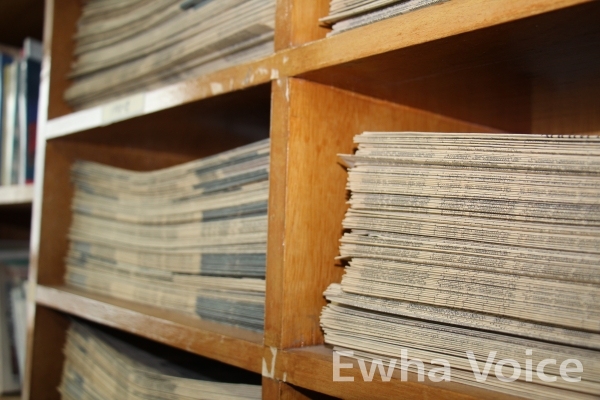
“The most important topic of discussion in journalism is how the press defines ‘community,’” Choi said. “This factor is also used to differentiate journalism in society from campus journalism. Although there is no major difference between the two types of media, campus journalism focuses on a narrowly defined community, which is the campus itself. This makes the most important role of campus newspapers and broadcast systems to be discussing different issues within the campus from various points of views.”
Choi mentioned that the decreased attention in campus journalism can also be explained in terms of the changes in society, and especially individualism. As university students these days do not have the time to make an effort to show attention to problems and issues in society due to their workload and busy schedules that tend to focus on themselves, the diminished interest in campus newspapers is a natural phenomenon, and it can be said the same for general journalism in the society as a whole.
Although it has not yet appeared as an actual situation in the press market, Choi also showed concerns about the decreased attention in journalism leading to decreased applicants in working fields of journalism. She emphasized that this would mean fewer people care about public issues, and as a result, it would negatively affect society as a whole.
“The individualistic trait of university students can also be explained as an effect of the COVID-19 pandemic,” Choi added. “Most university communities have collapsed in the past few years, with many students losing the chance to interact with new people and expand their span of knowledge, which I believe is the fundamental role of university. With the unstable community consisting of members that do not show interest in ‘our’ issues, it is natural for the interest in campus journalism to diminish.”
Meet the student-run newspapers at the heart of the campus: SNU News of Seoul National University
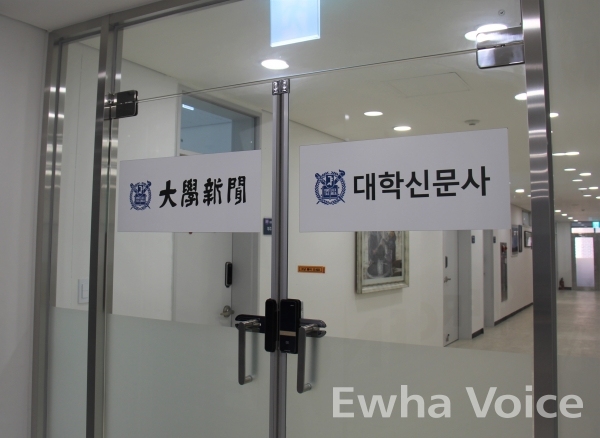
Despite the current struggles newspaper press face, student-led news still remains an essential part of campus life throughout countless universities across Korea.
SNU News, the campus newspaper of Seoul National University, has been the school’s official student-led independent news media since 1952. Also known as “Daehak Newspaper” in Korean, which directly translates to “University Newspaper,” it has retained its original name to uphold its establishment through the coalition of many different universities during the Korean War.
With their multiple offices lining a bustling hallway, SNU News reporters always have their hands full bringing up-to-date news to their students and campus staff.
Oh Soyeong, an undergraduate student from the Department of Political Science and International Relations and the current editor-in-chief of SNU News, described the newspaper as the officially verified, insider news source for their university students.
SNU News is a weekly newspaper consisting of 16 pages, separated into different sections including the Campus News Desk, Social & Culture News Desk, Photo News Desk, as well as Opinion Columns.
Oh explained that the reporters and staff of SNU News strive to remain an independent news outlet free of political bias, while highlighting not only campus issues but also social problems through the lens of university students.
To match the rising trend of using social media as a news source, as well as the preference for eye-catching visual news, SNU News recently established its New Media & Design Desk in 2020. This department is in charge of their official Instagram page and YouTube channel, where they upload card news content summarizing their articles, exclusive tidbits from their coverage process, as well as extensively planned documentary series.
Oh further commented SNU News is currently endeavoring to overcome their limits as a weekly newspaper by following up their regular issues with the latest breaking news online.
“It is our responsibility as the official campus news to present our students and staff with the trustworthy, up-to-date information,” she stated. “We are currently in the works of utilizing our new media platforms to fulfill this goal.”
Oh also put emphasis on the fact that no matter the changing format of the news, reporters should not lose sight of their original intention and enthusiasm to bring the best articles to their readers.
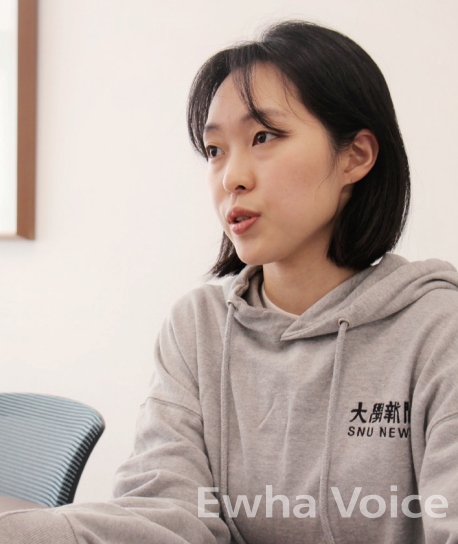
“The ultimate goal of a college newspaper is to capture the perspectives of college students on the world’s current events, all the while preserving its identity as a school newspaper,” Oh disclosed. “To overcome the current crisis that school newspapers are facing, I think it is crucial that we strive to maintain the best quality in our article coverage, even as we strengthen our new media platforms.”
Capturing moments on campus and exploring the depths of academia : The Argus of Hankuk University of Foreign Studies
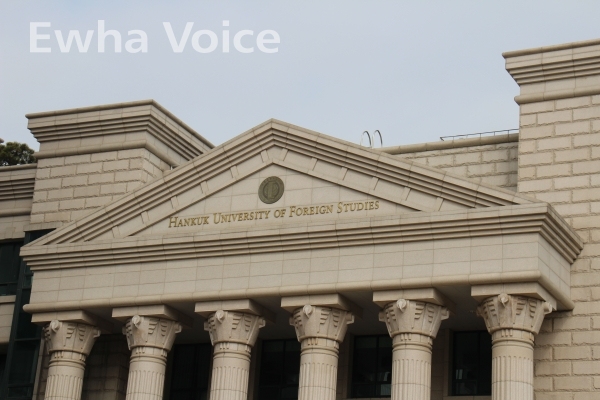

The Argus, a campus English newspaper established in 1954, is the former English newspaper and current English magazine of Hankuk University of Foreign Studies (HUFS).
Argus is the name of a gigantic monster from Greek mythology with 100 eyes that Hera used to stop Zeus’ habitual affairs. Just like the legendary creature, the magazine promises to deliver news both inside and outside the campus with critical insights, with more than 500 volumes published since its establishment as of March 2023.
Walking into the office, 97th Editor- in-Chief Cho Eun from Department of Linguistics and Cognitive Science warmly welcomed Ewha Voice through the shelves full of recent and historical copies of The Argus, showing its extensive history.
The Argus has changed to be printed as a magazine since 2007, in order to reflect the trend of reading less off paper. Currently, the newspaper not only deals with campus news but also academic news from various fields of study, under the motto of implementing both journalism and academism.
“As Editor-in-Chief, I believe campus journalism should not only deliver campus news effectively, but also help students learn news outside the campus more effectively than through other media outlets,” Cho said. “To achieve this, the current eight reporters of The Argus work to look for article items with timeliness, novelty, and justification.”
Cho also compared the current trend of The Argus to back in the days when campus journalism was much more influential and led even student demonstrations. Back then, The Argus, as well as many other campus newspapers and broadcasting stations, mainly covered events on campus with strong criticism and political situations. With the role of campus journalism shifting and the concepts of democracy and government changing, the recent reporters and editorialists have also been making efforts to make the articles more academic and modern.
“However, campus newspapers have always represented students’ voices and looked into the lives of the underprivileged,” Cho emphasized. “I believe this is crucial for university students these days with strong individualistic and success oriented thoughts, as at the end of the day, university students are those who will lead the society in the future.”
Where is the future of campus journalism headed?
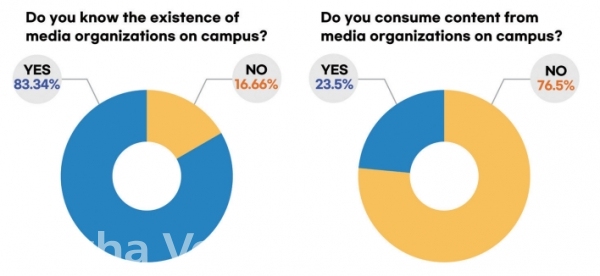
To look into the status quo of campus newspaper consumption, Ewha Voice conducted a survey of 120 students in their 20s from Feb. 27 to March 5. Results revealed that although 83.34 percent of the respondents are aware of the existence of media organizations on campus including the school newspapers and broadcasting stations, 76.5 percent answered that they do not consume content from them.
Respondents chose the most important role of campus media organizations as delivering campus news and advertising the school, as well as promoting academic and career-related information.
When asked on the role of campus journalism both on campus and within the society, most respondents replied that it contributes to establishing school identity, provides the chance for students to experience journalism on a smaller scale, and delivers accurate information to students and staff on campus.
“Campus journalism should be able to guarantee the students’ right to know and deliver subsequent information as autonomously student-led organizations,” said another respondent who wished to remain anonymous.
Professor Choi Jihyang from the Graduate School of Communication & Media emphasized that in the fragmented college society after the COVID-19 pandemic, campus newspapers and broadcasting systems need to feel a sense of duty of campus journalism.
Campus journalism is most likely to play a pivotal role in bringing the college society together again by attracting the audience with interesting enough topics to raise dialogue and debate.
Choi mentioned the significance of interactive social media platforms in this process, not only to advertise the campus media itself, but also as a medium for voluntary and intellectual discourse.
“I believe campus journalism is not only about writing an article for a college newspaper or creating a video for the broadcasting station,” Choi said. “Campus journalism should go far beyond, and contribute to the formation of an active and scholarly community.”
A researcher at the Ewha Media Center who wished to remain anonymous, mused that university newspapers and other campus media are gradually adapting to the newly rising media formats, albeit at a slower pace.
In the past, when digital media platforms had not been fully established or utilized, university students would not only look to their school newspapers as a campus information source, but also for political, societal news and entertainment.
Nowadays, she admitted that university newspapers have lost a large fraction of their home ground and reader demographic due to the rising popularity of easily accessible and conveniently comprehensible short-form news alternatives.
The researcher assessed that this was not solely because of the nature of the campus newspaper format. Instead, the issue stems from the fact that the younger generation in general, including current university students, are under a deluge of information and media content from various sources. It may be that they are simply losing time and attention to devote to university news because of their Instagram or YouTube feed.
As a response to this phenomenon, the researcher revealed that university media has noticeably been attempting to adjust to the changing needs of their students.
She shared that many campus newspapers are also producing short-form videos and interactive reader content, as well as many other methods of multimedia storytelling.
Ewha is no exception, and she asserted that the Media Center is more than willing to support the newfound endeavors of its student- led news agencies.
However, the researcher conceded that this process cannot help but be gradual. Because campus news is operated by students, not professionals, it is inevitable that they are able devote only a fraction of their time to set forefront of the changes to journalism.
She also pointed out that mass producing quick and easily consumable media and news content can lead to problems regarding content quality or accuracy.
Therefore, the researcher emphasized the importance of remaining true to the core principles of journalism regardless of changes in the format or reader demographics.
“I think the crux of the issue is solidifying the unique identity of student-led journalism in the times of digital information overload,” she commented. “Students are given countless opportunities to attempt new methods and make mistakes without severe consequences. I hope students can make the best out of these benefits and strive to produce quality content.”

